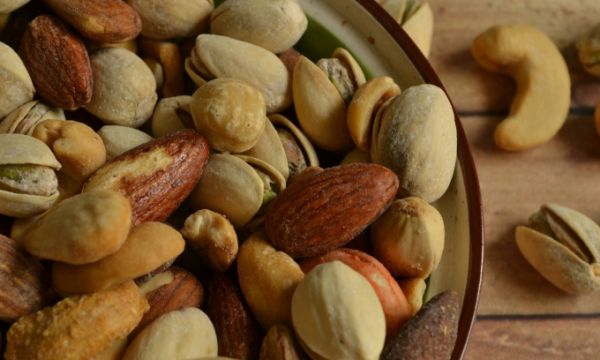
According to Healthlinenuts are nutrient powerhouses, rich in fiber, antioxidants, vitamins, minerals, healthy fats, and protein. Research cited by Health.com indicates that eating nuts may help reduce the risk of diabetes, heart disease, and certain cancers.
Here’s a closer look at nine of the healthiest nuts to include in your diet.
1. Almonds
One ounce (28 grams) of roasted almonds provides 170 calories, 15 grams of fat, 6 grams of protein, 3 grams of fiber, and essential nutrients such as vitamin E and magnesium.
Vitamin E helps protect cells from oxidative damage while supporting immune function and cellular communication. Studies show almonds may help lower LDL (bad) cholesterol and reduce inflammation, promoting heart and gut health.
2. Pistachios
Pistachios are lower in calories and fat than many other nuts, with 159 calories, 13 grams of fat, and 6 grams of protein per ounce. They are also rich in vitamin B6 and antioxidants like lutein and flavonoids, which contribute to their ability to help reduce blood pressure, enhance metabolism, support immune function, and promote overall heart health.
3. Walnuts
Walnuts are notable for their high levels of ALA omega-3 fatty acids, providing 2.57 grams per ounce. They also contain essential minerals like copper and manganese, which support brain health and immune function.
Research suggests that walnuts can lower LDL cholesterol, blood pressure, and triglycerides, reducing the risk of heart disease.
|
Assorted nuts in a bowl. Illustration photo by Pexels |
4. Cashews
An ounce of cashews contains 157 calories, 12 grams of fat, and 5 grams of protein. They are a good source of vitamin K, magnesium, and manganese, which are essential for bone health.
Studies suggest that cashews may help improve blood pressure and triglyceride levels, though further research is needed.
5. Pecans
A one-ounce serving of pecans provides 201 calories, 21 grams of fat, and 3 grams of fiber, along with zinc and manganese. Zinc supports immune function, wound healing, and DNA synthesis.
Pecans may also help improve heart health by lowering LDL cholesterol.
6. Macadamia nuts
Macadamia nuts contain 204 calories, 21.5 grams of fat, and 2 grams of protein per ounce, along with vitamin B1 and manganese. Research shows that macadamia nuts can help lower LDL cholesterol, triglycerides, and blood sugar levels.
7. Brazil nuts
Brazil nuts are an excellent source of selenium, with a single ounce providing 989% of the recommended daily value. Selenium supports thyroid function and DNA synthesis but should be consumed in moderation to avoid overconsumption.
These nuts are also rich in vitamin E and magnesium, which helps regulate blood sugar and blood pressure, support normal nervous system function, and aid in energy production. Additionally, they possess anti-inflammatory and antioxidant properties.
8. Hazelnuts
Hazelnuts provide 178 calories, 17 grams of fat, and 4 grams of protein per ounce. They are rich in vitamin E, manganese, magnesium, and beneficial plant compounds. This nutritional profile may help lower LDL and total cholesterol while also offering anti-inflammatory benefits.
9. Peanuts
Though technically legumes, peanuts have a nutritional profile similar to tree nuts. They are rich in protein, with 7 grams per ounce, and contain polyphenol antioxidants and folate. Folate is especially important during pregnancy, supporting fetal and placental development.
Peanuts may also reduce the risk of cardiovascular diseases and stroke, though this benefit does not extend to peanut butter.